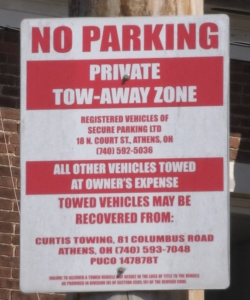Athens City Council set to dismantle local towing ordinances years after the state granted regulatory powers to PUCO
By: Jada Respress
Posted on:
ATHENS, Ohio (WOUB) — Athens City Council is set to dismantle towing ordinances that haven’t been enforced for over 15 years.

Athens Police Chief Tom Pyle and Law Director Lisa Eliason brought a recommendation to Council Member Jeff Risner to get rid of the ordinance.
“Our entire efforts have been to reduce our liability exposure for having ordinances that aren’t enforced and there’s confusion around that,” Pyle said.
Cities have historically set towing fees and licensed tow operators. But in 2012, the Ohio Legislature passed a law giving this authority to the state Public Utilities Commission. The city of Cleveland challenged the law and the Ohio Supreme Court ruled in 2014 that cities could continue to license tow operators if they wished, or they could let PUCO handle it.
PUCO also sets maximum rates for tows from private property, which is $129 for passenger vehicles. Cities can set their own rates for tows from public property. The rate set by the city of Athens in 2002 is $50.
In May, Pyle told the City Council the city’s towing ordinance had not been enforced in years. He said tow operators have been using the fees set by the state for tows from both public and private property and the city has been letting the state handle licensing.
Pyle said licensing tow operators would create extra work for the Police Department. And he said the city’s 20-year-old towing fee is so low that tow operators would not work for that rate.
Pyle has attempted to resolve this issue for five years now and it seems this time it will take. The ordinance to eliminate the city’s towing code is set for a third reading on August 1, meaning that if a majority of the City Council votes in favor, it will go into effect in 30 days to give people the power of referendum.
However, community and council members raised some concerns about getting rid of the code. Council Member Alan Swank’s main argument is that keeping local control can save citizens time and money rather than having to turn to PUCO in Columbus for any towing issues.
“By licensing it locally it would be lot easier to appeal those sort of things,” Swank said.
Swank proposed an alternative solution that doesn’t completely relinquish the power of towing into the hands of the state.
He suggested the city put out a bid for towing operations within city limits. Whoever wins the bid would become the official tower for the city for a certain period of time. He doesn’t know yet if the city has the legal authority to do this.
Community activist Damon Krane said he did research on the topic and believes the tows that have occurred in Athens “since the end of 2014 have been illegal” because the city is not enforcing its own towing regulations.
“The city simply has refused to follow the law, and it’s not just the city law it’s the state law that backs it up,” Krane said.
Krane said he has been directly affected by the towing in Athens. In June, Krane claimed that he had a negative experience with a local towing company, which then posted his name and address on social media. He is one of many in Athens who have complained about towing.
People are using community Facebook groups to voice their frustrations about their encounters with towing operators and the fees they charge.
“For the public towing the companies were all charging up to the (PUCO) cap that’s $80 over what the local cap is,” Krane said.
If the proposed ordinance is passed then all authority for licensing tow trucks and setting fees for public tows will be handled by the state.
Pyle said that nothing would really change since this is how it’s been working practice anyway.

